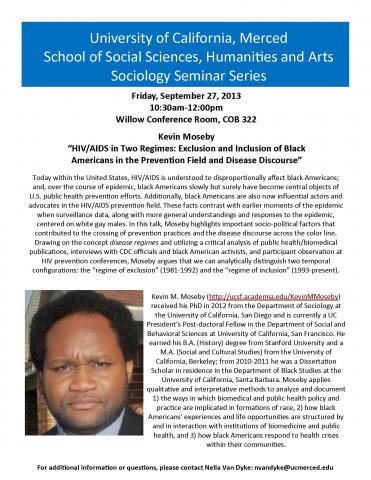HIV/AIDS in Two Regimes: Exclusion and Inclusion of Black Americans in the Prevention Field and Disease Discourse
Kevin M. Moseby, PhD
UC President’s Postdoctoral Fellow
UC-San Francisco
Department of Social and Behavioral Studies
Today within the United States, HIV/AIDS is understood to disproportionally affect black Americans; and, over the course of epidemic, black Americans slowly but surely have become central objects of U.S. public health prevention efforts. Additionally, black Americans are also now influential actors and advocates in the HIV/AIDS prevention field. These facts contrast with earlier moments of the epidemic when surveillance data, along with more general understandings and responses to the epidemic, centered on white gay males. In this talk, Moseby highlights important socio-political factors that contributed to the crossing of prevention practices and the disease discourse across the color line. Drawing on the concept disease regimes and utilizing a critical analysis of public health/biomedical publications, interviews with CDC officials and black American activists, and participant observation at HIV prevention conferences, Moseby argues that we can analytically distinguish two temporal configurations: the “regime of exclusion” (1981-1992) and the “regime of inclusion” (1993-present day).
Kevin M. Moseby (http://ucsf.academia.edu/KevinMMoseby) received his PhD in 2012 from the Department of Sociology at the University of California, San Diego and is currently a UC President’s Post-doctoral Fellow in the Department of Social and Behavioral Sciences at University of California, San Francisco. He earned his B.A. (History) degree from Stanford University and a M.A. (Social and Cultural Studies) from the University of California, Berkeley; from 2010-2011 he was a Dissertation Scholar in residence in the Department of Black Studies at the University of California, Santa Barbara. Moseby applies qualitative and interpretative methods to analyze and document 1) the ways in which biomedical and public health policy and practice are implicated in formations of race, 2) how black Americans' experiences and life opportunities are structured by and in interaction with institutions of biomedicine and public health, and 3) how black Americans respond to health crises within their communities.


